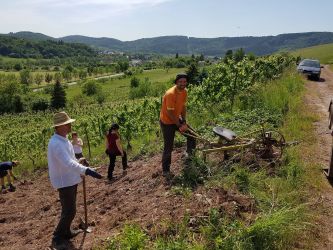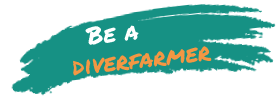The Continental regional groupof the Diverfarming project informed German and Luxembourgian winemakers, scientists, industry representatives and stakeholders about the progress in their case study.
The Continental regional group investigates the effects of intercropping grapevine and aromatic plants.
Following WP10 “Coordination and Dissemination” the Continental regional grouphave organised an engagement seminar for presenting preliminary results to winemakers, scientists, industry representatives and stakeholders.
Due to the Covid-19 restrictions, the seminar was conducted online with Microsoft Teams.
The meeting was attended by 77 participants (54 winemakers, 8 stakeholders, 6 scientists, 5 industry representatives and 4 privates) plus the organisers [see attendance list]. The meeting started at 10:00 am and lasted until 12:00 pm.
 First, Dr. Manuel Seeger (Trier University, Dpt. of Physical Geography) bid welcometo the participants from Germany and Luxembourg, remarked the aim of the meeting and presented the different organisers as well as the Diverfarming project in general and the Continental case study in particular.
First, Dr. Manuel Seeger (Trier University, Dpt. of Physical Geography) bid welcometo the participants from Germany and Luxembourg, remarked the aim of the meeting and presented the different organisers as well as the Diverfarming project in general and the Continental case study in particular.
Next, Cord-Henrich Treseler (Weingut Dr. Frey) reported the first results of “WP3Crop production and quality” and explained the work effort to establish, maintain and harvest the herbs under vine from the authentic perspective of a winemaker. Moreover, he reported about wine quality, land equivalent ratio and gave insight about economic benefits and drawbacks.
As third speaker, Felix Dittrich (Trier University, Dpt. of Soil Science) presented selected results from “WP4. Impact of crop diversification on biodiversity” and “WP5. Environmental impact and delivery of ecosystem services by crop diversification”.
The discussion showed a general agreement to promote sustainable alternatives in the management of vineyards and a keen interest in diversification and not only with an economic, but at least a clear ecologic benefit.
The whole “Microsoft Teams Meeting”was recorded and the video file can be viewed by following this link (in German):https://video.uni-trier.de/Panopto/Pages/Viewer.aspx?id=686d2b09-cfce-4834-84f0-ac8700e547b4
Diverfarming is a project financed by the Horizon 2020 Programme of the European Commission, within the challenge of “Food Security, Sustainable Agriculture and Forestry, Marine, Maritime and Inland Water Research and the Bioeconomy”, under agreement 728003. It counts on the participation of the Universities of Cartagena and Córdoba (Spain), Tuscia (Italy), Exeter and Portsmouth (United Kingdom), Wageningen (Netherlands), Trier (Germany), Pecs (Hungary) and ETH Zurich (Switzerland), the research centres Consiglio per la ricerca in agricoltura e l'analisidell'economiaagraria (Italy), the Consejo Superior de InvestigacionesCientíficas (Spain) and the Natural Resources Institute LUKE (Finland), the agrarian organisation ASAJA, and the companies Casalasco and Barilla (Italy), Arento, LogísticaDFM and Industrias David (Spain), NieuwBromo Van Tilburg and Ekoboerdeij de Lingehof (Netherlands), Weingut Dr. Frey (Germany), Nedel-Market KFT and Gere (Hungary) and PaavolanKotijuustola and PolvenJuustola (Finland).










